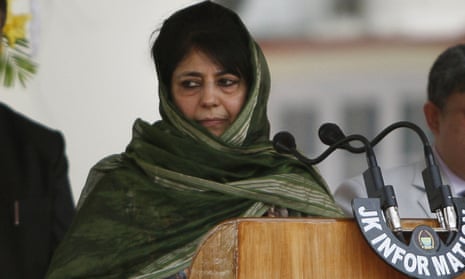Mehbooba Mufti, the leader of the pro-India Peoples’ Democratic party, has become the first female chief minister of India-controlled Kashmir.
Mufti took took the oath of office on Monday after the death of her father, ending the deadlock over the formation of a new state government.
The chief minister’s post fell vacant when Mufti’s father, the PDP founder Mufti Mohammed Sayeed, died in January. However, Mufti was reluctant to continue her party’s coalition with the Hindu nationalist Bharatiya Janata party without an assurance from its leaders that they would take “confidence building” steps to improve the restive Himalayan region.
Mufti, 56, held a meeting with the Indian prime minister, Narendra Modi, last month but details of her agreement with the BJP remain unclear.
The PDP’s coalition with the BJP in Kashmir followed prolonged negotiations, as no single party won the majority needed to form a government in the state during elections in 2014.
The alliance marked the first time the rightwing BJP held a leadership position in the Muslim-majority region also claimed by Pakistan.
The PDP emerged as the largest single party with 28 of the regional legislature’s 87 seats; the BJP won 25 seats – all in Hindu-dominated districts.
The two parties hold diametrically opposite views on several issues, including a law that protects Indian military personnel from criminal prosecution in the violence-racked Himalayan region. The PDP wants the law scrapped, which the BJP opposes.
The BJP also opposes Kashmir’s special constitutional status, which allows the region to make its own laws, while regional parties including the PDP defend it.
Rebels have been fighting against Indian rule in the state since 1989. More than 68,000 people have been killed in the uprising and a subsequent Indian military crackdown.
